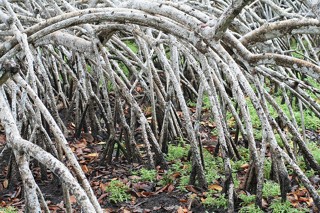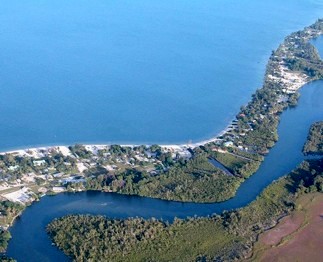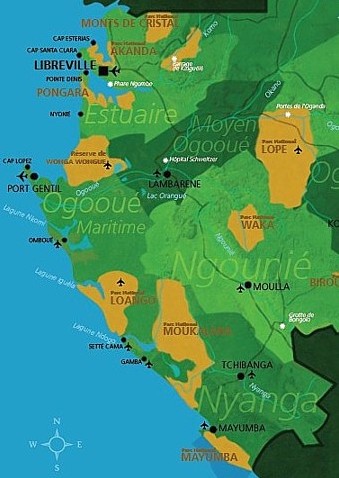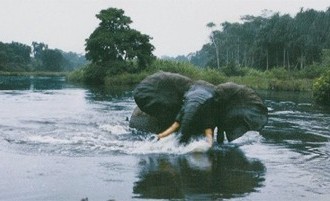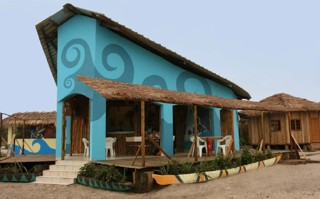|
Gabon Travel - Leisure Your secret African travel destinations: Gabon: Sharing the beach with hippos
Unlike many other national park schemes in Africa that suffer from underfunding, oil-rich Gabon made sure these parks were to be well managed and controlled. Rough logging and decimation of wildlife through poaching was to be curbed. Also unlike most parks in other nations, Gabon has set aside large tracts of its coastline for conservation. Not without a reason. "Ecotourism" was to pay for the new parks, and the new tourism industry should become Gabon's source of wealth as oil reserves are declining. And nothing could be more attractive than Gabon's tropical paradise coastline. Several years have passed, and Gabon still has not developed a significant tourism industry. But the ecotourism scheme remains alive. The national parks, especially along the coastline, are to host "top-of-the-range tourist facilities," according to government priorities. Luxury, stiff prices and exotic pure nature are the recipe - for the future. Gabon authorities still are seeking investors. Meanwhile, the paradise-like coastal parks remain underdeveloped but still somewhat accessible to travellers. And as infrastructure still is basic, prices are not as stiff yet - although Gabon in general is one of Africa's most expensive countries. So, while the parks and most beautiful beaches still can be a bit difficult to reach, at least the big fences protecting upper class tourist facilities have not been set up yet. Around Libreville The Akanda and Pongara national parks are located very close to Libreville, the capital of Gabon, a
If you are not familiar with the rich ecosystem represented by the mangroves, Akanda, just north of Libreville, is a perfect way to become so. The tidal beaches, some of which provide perfect bathing opportunities, are fringed by walls of green cut by brown creeks and rivers. Wildlife is abundant in the mangroves, and especially abundant in Akanda. Nowhere else in Gabon has such a high density of birds - both exotic tropical species and the many migratory birds stopping here. At the beaches, turtles lay their eggs; in the forests apes loudly make aware of their presence; and in the sea, whales and other marine mammals are abundant. Even the hobby botanist will be satisfied, finding anything from giant trees to seldom orchids. How to experience this nearly untouched, wild spot on earth? "Cap Caravanes" in the Akanda park, a creative concept with floating, mobile bungalows towed along the rivers by a boat, offers visitors an unusual access to the park and a unique experience. The floating hotel also has a restaurant and offers visitors sports fishing on smaller boats on the river. Pongara National Park is located just south of Libreville, on the Pointe Denis Peninsula other side of the Gabon (Komo) Estuary, from where it only can be reached by boat or pirogue. In addition to the mangrove forest delights also experienced in Akanda, Pongara is also endowed with a relatively large chimpanzee population. But the park was mainly created to protect egg-laying sites of leatherback turtles. You can watch the threatened species climbing onto the beach laying their eggs during the turtles' nesting season from January to March. The park is Gabon's most easil
Southwards along the coast While Pongara is the most developed coastal destination in Gabon, also well-used by the upper-class of Libreville, the coastline further south has less tourism infrastructure but more natural delights to offer. Unfortunate for the tourist, but good for the environment, only few parts of the coast are connected by road. Indeed, Port-Gentil is a better base for overland excursions to the Gabonese coast than Libreville. From here, Gabon's oil capital, a major road goes southwards along the coast. Port-Gentil itself has a nice beach and many leisure activities, including excursions to the coastal Wonga Wongué Reserve north-east of city with large populations of elephant and buffalo. Travelling southwards from Port-Gentil, the characteristic lagoon landscapes start appearing, with spectacular sandy beaches between the salt and sweet water and forests full of wildlife behind the lakes. These lagoons are the jewels of Gabon's grand ecotourism scheme and are slowly gathering investments to establish one luxury lodge after the other. Only a short pirogue trip to the south of Port-Gentil, in Ollendé, the first lagoon-based lodge is found. At the rustic Oguendjo Tarpon Club, fishing opportunities, boat trips and swimming stand out as the main activities. Further south, the road crosses the mouth of the Ogooué River, Gabon's greatest, before it reaches the Nkomi Lagoon. This is the largest lagoon of the Gabonese coast and not part of any protected area. Still, the landscape, beaches, forests
Further south, the road reaches the village of Iguéla, but not the beautiful Iguéla Lagoon, for which a pirogue is necessary. Iguéla Lagoon is part of the extended Loango National Park, Gabon's most characteristic, and can also be reached by air. The Loango National Park is marketed as a "natural wonder" with "elephants on the beach and hippopotamuses surfing the waves." While you will need some patience to see these great mammals on the beach, it can indeed be experienced together with a good guide. Loango nevertheless is tremendously beautiful and a real pearl for Africa-lovers. Also, its unique biodiversity cannot be doubted, as the park includes rainforests, savannas, lagoons and beaches in a unique mosaic. Everything from gorillas and chimpanzees to humpback whales, forest elephants and buffalos and a great variety of tropical birds can be spotted. The fantastic national park does indeed have some tourism infrastructure, with several luxury lodges providing excellent but expensive services. The main concept is that you book packages in advance and fly in from Libreville or Port-Gentil. Competent staff will guide you to the main attractions and activities include sports fishing, beach life and excursions into the jungle. The coast further south is of immense beauty, very sparsely inhabited and almost untouched. But it is also very difficult to reach. There is still no focus on building tourism infrastructure here and if you manage to reach this coastal paradise, your adventure will be complete and unique. The only exception is Setté Cama Village close to the town of Gamba - which is reached by air and road - where several lodges at the Ndougou Lagoon provide exciting nature and cultural experiences. Only in the extreme south, the fantastic May
Also the Mayumba park is mainly organised for expensive luxury packages, with accommodation in very comfortable and competent lodges close to the beach. Here, lovely African and international cuisine is offered, along with a long list of nature-related adventures. However, the village of Mayumba at the park's entrance has some hotels that are a bit cheaper. Unless you are a beach addict, you are well advised to also leave Gabon's marvellous coast and discover the inland. Here, a large number of natural parks protect some of the worlds most beautiful and biodiverse rainforests, often in mountainous landscapes. For example the Moukalaba-Doudau National Park close to the Loango. More accessible and equally exciting are the Lope and the Crystal Mountains national parks in the north. But the vast interior goes beyond the scope of this article. We can only conclude that Gabon is among the world's most thrilling tropical environment travel destinations. With the only drawbacks being high prices and poor accessibility, Gabon's coast and inland remains a highlight among Africa's secret travel destinations ... or, a "still secret" destination on the verge of being discovered. Your secret African travel destinations series This article is one in an afrol News series dedicated to the many genuine and "undiscovered" travel destinations in Africa, published in 2010. Click here to get more inspiration and new ideas for travelling to the great and welcoming continent of Africa. By staff writers © afrol News
Current afrol News Top Stories
|
front page
| news
| countries
| archive
| currencies
| news alerts login
| about afrol News
| contact
| advertise
| español
©
afrol News.
Reproducing or buying afrol News' articles.
You can contact us at mail@afrol.com


